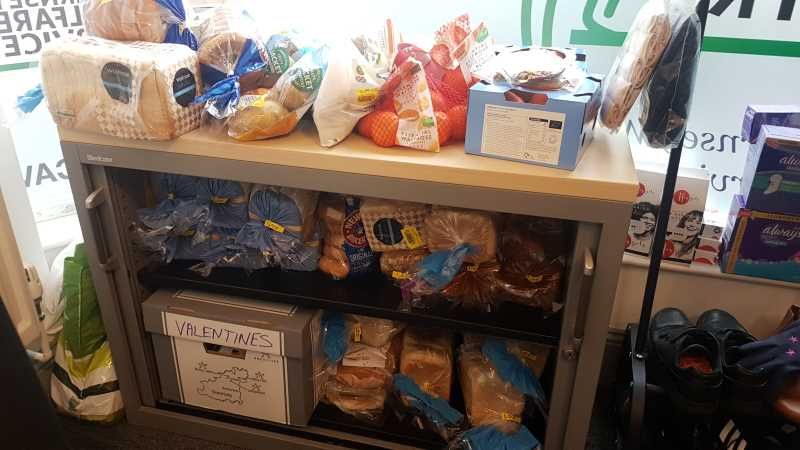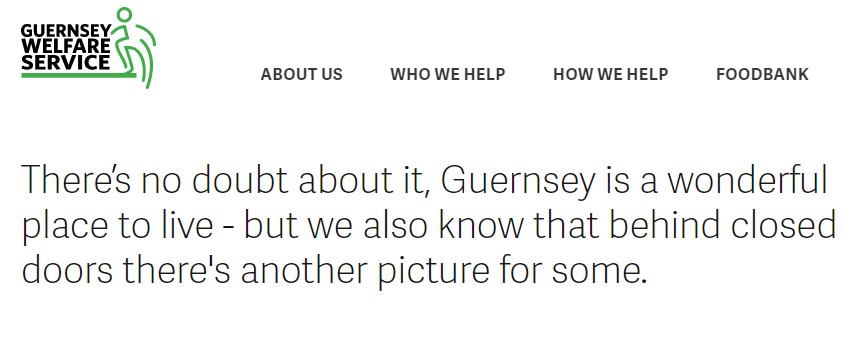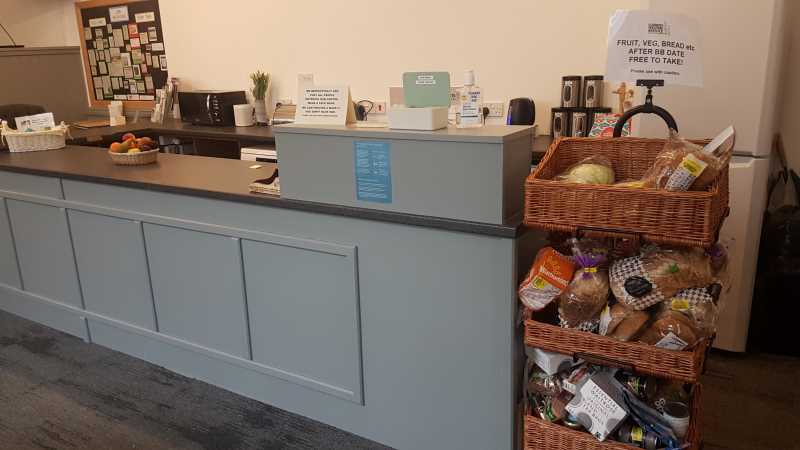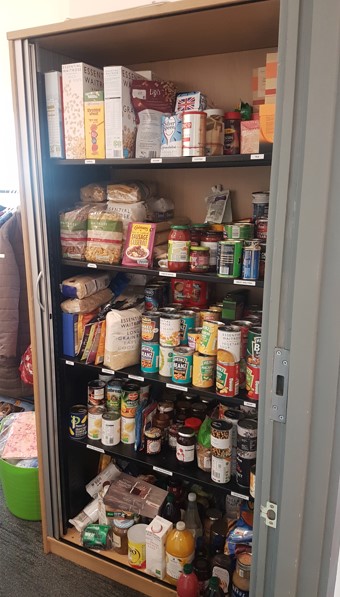


The food bank run by Guernsey Welfare Service had its busiest month ever in December and helped a record number of households in 2021.
Before the covid-19 pandemic, the food bank typically supplied around 450 households each year.
In 2019, 460 households used the food bank. At the time, that was the highest number in a single year.
In 2020, the number of households helped rose to 560.
And last year, the number rose again - to a record 584, including 379 in December alone - an increase of more than 25% in just two years.
Welfare Service Manager Sue Le Friec told Express that the food bank, which started in 2012, keeps weekly, monthly and yearly records of the households helped because it can then track any trends.

Pictured: The number of households assisted by the Guernsey Welfare Service and the type of assistance they require paints a picture of the scale and nature of underprivilege in Guernsey despite the island's general affluence.
The food bank records 'unique households' supplied. Each unique household can be an individual or a family.
Mrs Le Friec said that when people first approach the food bank for assistance they are invited for a confidential chat with her or a colleague. Their circumstances are established and then they are invited to choose from a variety of items, including fresh, frozen and store cupboard food.
The food bank also keeps essential items such as nappies and other goods such as cooking utensils, linen and children's toys.
The team of four part-time staff at the food bank, supported by around 30 volunteers, had anticipated an increase in demand during the pandemic as families were affected by job losses and other financial pressures.
Mrs Le Friec said they changed the way they operated to meet the limitations imposed through lockdowns and other covid-19 restrictions. This included introducing a delivery service for households who could not pick up food parcels themselves.
"Some people still get deliveries," said Mrs Le Friec. "We don't offer deliveries to everyone. It has to be for those who can't get here themselves."

Pictured: Guernsey's food bank works hard to present users with a similar feel to a welcoming coffee shop.
Visitors to the food bank are able to have a drink and chocolate or a biscuit, depending on the treats opened on the day. There are comfortable waiting areas, including discreet corners where anyone in need of help can speak to volunteers. Other organisations are sometimes there too, including the States' Job Centre, which sends a representative weekly.
Other than the expected short term rise in numbers during the pandemic, Mrs Le Friec said there are no obvious patterns to when the food bank is busier or quieter.
"December is always busy, but other than that it's hard to tell," she said. "School holidays are possibly quieter. That might be because parents don't want to bring their children in here. But it's not really any quieter or busier at any times, apart from in December."
For a time, the food bank ran out of the Professor Shaw Community Centre in St Martin's, and only for a few hours each week.
It was then based at Trinity Church in Town for nine years. There was a storage cupboard and a small seating area. Mrs Le Friec said it had a very positive relationship with the church and its members.
In May last year, the food bank moved around the corner to the bottom of Upper Mansell Street. Now it is based in what was once Les Caves de Bordeaux, and later Cleo's, before becoming a youth centre for a while.
At this new dedicated facility, the food bank is open five days a week - mainly mornings and also now on one evening a week after staff noticed demand for a later opening time.
Mrs Le Friec said that moving into dedicated premises has been positive for staff, volunteers and the people using the food bank. She said it is more relaxed with additional storage space and other facilities.

Pictured: The food bank is open five days a week.
Mrs Le Friec said the Welfare Service has come a long way since it was launched more than 125 years ago.
"Guernsey Welfare was established in 1896, so last year we celebrated our 125th anniversary. It was set up as a Christian charity responding to poverty in the island. You can imagine what poverty there was then.
"We're here to help low-income families. That hasn't changed. We used to give out vouchers for food and heating and then in 2012 the food bank started. We realised that if we buy the food to distribute then the money goes a lot further. The food bank helps a lot more people than we used to be able to help."
As well as staple items like pasta, baked beans and soup, the food bank now distributes frozen food, fresh fruit and vegetables, milk, cheese and eggs. It also keeps a supply of food, such as bread, which is close to its best before date.
Through donations of food and money, the Welfare Service is able to provide poorer households with food worth hundreds of thousands of pounds every year.
Mrs Le Friec said that in 2021 it distributed food worth £171,000. It also still provides vouchers for some food items and to put towards heating costs.

Pictured: The food bank keeps a running supply of store cupboard essentials for people to choose from.
Mrs Le Friec said that food and vouchers are for people who have reached crisis point in their lives. There are rules to avoid anyone becoming reliant solely on the food bank for sustenance.
"We take our responsibilities very seriously. We are giving away thousands of pounds' worth of food every year, so we have to take it seriously. People trust us to handle their donations.
"We limit the frequency of visits to the food bank to once a month. We give out vouchers on alternate months. We're here to help people through times of crisis."
The food bank generally does not provide food to children trying to access the service without an accompanying adult or the support of another suitable agency.
"We cater to a really wide range of ages, but we do say no to under 18s. If any do come to us, they have to be referred by other groups like Action for Children. Legally, they're still a child when they're under 18, and we don't know what their situation might be. If we were to help, we could be enabling them to stay in unhealthy situations. If someone like Action for Children asks us to help someone under 18 then we do, but otherwise they should be being supported by care workers."
The food bank aims to ensure anyone using it has access to a nutritional and varied diet and not just the basics. But at Christmas it gave out treats of chocolate and biscuits which had been donated to be redistributed and it is hoping to do the same at Easter.
"People can choose what food they want to take. We have a small stock on show with a variety of all the items from our main stock room. A family of four might get a £25 voucher or they might get two carrier bags of food worth around £80."

Pictured: The Committee for Employment & Social Security provides the Guernsey Welfare Service with an annual grant towards running costs.
Mrs Le Friec and her colleagues understand why some people find it hard to make the first step in contacting the Welfare Service for help. But she feels assured that most users are pleased they got in touch.
"The majority of people know they've made the right choice and they're glad when they have.
"If you're anxious about coming in, you can phone first. Have that conversation first - it breaks the ice. Then come in and we'll have a private chat with you and let you take some food.
"Most of our clients are really lovely people who have hit hard times or they need to break a cycle. We try and help them do that. Some people do come regularly for a while. Some people might come once and be embarrassed maybe and never come back again. Other people come back to donate. People feel happy knowing they're donating healthy, nutritious food or treats. Both are important.
"It's very easy to live in Guernsey and not see poverty. But there is help available. It's easy to fall on hard times. A lot of people may say 'I never thought I'd be using a food bank'."
The Welfare Service prefers to receive donations of store cupboard items, such as tinned fruit over fresh, because it lasts longer if it is not eaten straight away and is still nutritious.
Comments
Comments on this story express the views of the commentator only, not Bailiwick Publishing. We are unable to guarantee the accuracy of any of those comments.